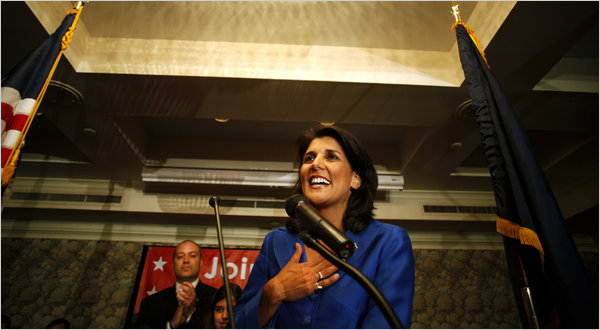The beginning of the end of ethnic identity politics
 Monday, July 19, 2010 at 12:07AM
Monday, July 19, 2010 at 12:07AM 
An argument that says Obama was less the breakthrough than the political codification of a lengthy demographic transformation that encompasses my nearly five decades of citizenship.
If anyone still doubted, after President Obama’s election, that candidates are no longer prisoners of their race or ethnicity, then South Carolina’s Nikki Haley offers further proof. Ms. Haley, 38, was born Nimrata Nikki Randhawa, the daughter of Indian Sikh immigrants. Now she is the Christian, Republican nominee for governor in a state with a brutal history of racial oppression.
What’s notable about Ms. Haley’s campaign, like that of Mr. Obama and other candidates, is not just that she has breached a racial and cultural barrier, but that she doesn’t feel the need — or the desire — to talk much about it. “I love that people think it’s a good story, but I don’t understand how it’s different,” she recently told The New York Times. “I feel like I’m just an accountant and businessperson who wants to be a part of state government.”
Such reticence probably reflects the complicated set of expectations imposed on candidates like Ms. Haley. (Gov. Bobby Jindal of Louisiana, who is Indian-American, and Gov. Deval Patrick of Massachusetts, who is black, also come to mind.) We are attracted to the idea that they have transcended ethnic boundaries and reaffirmed the American ideal.
At the same time, we do not expect them to dwell on their stories in the way that ethnic candidates of a previous generation routinely did. And so we create a more diverse politics that is in some ways more cautious and anodyne, too, increasingly populated by candidates who are easy to support but harder, perhaps, to really know.
To understand what has changed, think back 40 years or so, when a generation of ethnic, white candidates — Democrats, for the most part — were rising up through urban political machines. Politics then was delineated primarily by economics; if you were the working-class child of, say, Irish immigrants, chances are you had a lot in common, politically, with struggling Italian and Jewish voters in your district, too.
There was an advantage, then, in drawing attention to your journey, through anecdotes and jokes that served to underscore the universality of the immigrant experience. Take, for instance,Michael S. Dukakis, the Democratic nominee for president in 1988, whose story of Greek immigration so defined his political career that the comedian Jon Lovitz immortalized it in a line from one of the more enduring impersonations on “Saturday Night Live”: “My parents were little people. Little, swarthy people.”
Whenever I watch historical movies with my kids, I am constantly forced to explain that a lot of what they see in them, in terms of social mores, were the way things were throughout most of history (especially the treatment of women) and that the vast majority of social equality has been achieved really in only the last half century or so.
And yeah, I don't think that's a coincidence. America becomes a global superpower and we see radical change result and spread throughout the system, to include powerfully positive feedback to the US itself (for example, we don't deal with civil rights until after we expose our population to the world so fully in WWII and then realize how backward we remained on that subject).
Another thought triggered: Obama running for re-election will widen the door even further, because almost anyone from any background can take him on and conceivably win.
Which has me thinking seriously about Michael Bloomberg.











Reader Comments